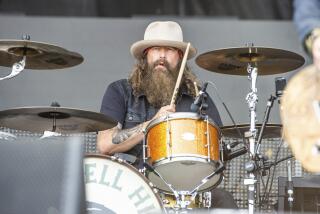John Prine is still singing about heaven and mortality — and sounding as vital as ever
John Prine has a number of ideas of what he thinks heaven might be, all of which are the focal point of one of 10 new songs on his first album of original material in a dozen years, “The Tree of Forgiveness.”
The veteran singer and songwriter, best known for such songs as “Hello in There,” “Angel From Montgomery” and “Sam Stone,” also is pretty well convinced of one thing he doesn’t expect to find should he make it past the Pearly Gates one day.
“Surely they don’t have ‘No Smoking’ signs in heaven,” Prine, 71, said with a grin and a gravelly chuckle on a cool afternoon this week at his Hollywood hotel, a couple of days before a scheduled appearance at the Grammy Museum on Wednesday as well as his concert on Friday at the Ace Hotel downtown.
“I really miss smoking cigarettes,” he said by way of explanation of the genesis of “When I Get to Heaven,” a strikingly humorous take on life after death. “I gave them up the night before I had my neck surgery.” (He underwent an operation 20 years ago to remove a malignant tumor.)
“The doctor in Houston said, ‘I can’t tell you your history of smoking did this to you. But wouldn’t it be a great time to stop?’ I said, ‘You know, you’re right,’” Prine said. “I had two little kids, they were 2 and 1 at the time. I thought, I’m lucky to be getting by with this cancer thing.
“So I gave it up,” he added. “But I never gave up thinking about it. When I see people in a bar fire up, I go over and stand next to them, or if they’re standing outside a restaurant, I just kind of stand near enough so I can get that initial blast.
“I thought, ‘Where in the hell can I smoke cigarettes? It’s not going to be anywhere down here.’ So I thought, maybe when I get to heaven I can smoke cigarettes,” he said. “That’s how I came up with the [lyrical reference to a] cigarette nine miles long and the rest of the thing.”
Prine was opening a window into his creative process that’s every bit as acute today as it was when he put out his 1971 self-titled debut album,still regarded as one of the most auspicious arrivals in pop music history.
“When I Get to Heaven” is among 10 new songs that address issues of aging and mortality, although Prine said it was a surprise to him when he sat back after the record was done and soaked in the new collection.
“I thought I had 10 songs I believed in,” he said with the permanent growl that’s been with him since he beat the cancer by sacrificing a significant part of the right side of his neck. “But I didn’t think any of them had anything to do with each other, or that there was any kind of theme running through the record.”
It shows up in songs as light-hearted as “When I Get to Heaven” and as darkly foreboding as “Caravan of Fools, which he wrote with the Black Keys’ guitarist, singer and songwriter, Dan Auerbach, and one of his frequent collaborators, Pat McLaughlin.
“The only time I ever think about getting old is when I look in the mirror,” said Prine. “I feel pretty good about it, actually. I can remember other times in my life when I haven’t been this settled. It’s a really good feeling.”
Prine has plenty to feel good about these days. In the month since it was released, “The Tree of Forgiveness” has sold more than 70,000 total equivalent sales, according to the Nielsen sales monitoring service, and has garnered mostly positive reviews.
Prine said he thought another song he wrote with Auerbach, “Boundless Love,” was initially for Auerbach’s 2017 solo album, “Waiting on a Song.”
Then Prine decided to record it himself. “I called Dan and told him, ‘I’m going to have to John Prine this song up.’
“He said ‘What do you mean?,’” Prine said. “I said, ‘Well, there’s a part where the guy wants to come home and he asks [his woman] if she’ll make him some food. I said I’m going to make it ‘fry me some pork chops.’
“Then I replaced the second verse with ‘I’ve got a heart like an old washing machine/ Bounces ’round till my soul comes clean.’ I said, ‘That sounds more like John Prine,’” he said with a laugh. “And I’ll be darned, those songs live, especially ‘Boundless Love,’ are really taking off. The crowd really seems to like it.”
As has been the case historically, Prine moves effortlessly among songs bursting with humor to others that resonate deeply and profoundly, such as “Summer’s End,” an impressionistic meditation on the passage of time, loss and forgiveness.
His career is now managed by his wife, Fiona. And Oh Boy Records, the label he set up more than 30 years ago, making him one of the first musicians to go independent, is being overseen by his son, Jody, since the death in 2015 of Prine’s longtime manager, Al Bunetta.
Prine’s long been a critical favorite, and early on caught the attention of esteemed peers including Kris Kristofferson, who was among the first to champion the erudite songs that allowed Prine to quit his day job as a mail carrier in Chicago.
Bob Dylan also has sung his praises over the years, telling writer Bill Flanagan almost a decade ago that “Prine’s stuff is pure Proustian existentialism. Midwestern mindtrips to the nth degree. And he writes beautiful songs.”
He also has become a touchstone for a new generation of articulate and insightful country and Americana singer-songwriters including Miranda Lambert, Kacey Musgraves, Sturgill Simpson, Jason Isbell, Amanda Shires, Brandy Clark and Margo Price, among many others.
A number of them have shared concert bills with him, recorded one or more of his songs or, in the case of husband-wife team Isbell and Shires, sung harmonies with him on the new album.
In fact, one of the first things Musgraves did on arriving in Nashville from her native Golden, Texas, was to look Prine up at one of his shows and try to get him appropriately conditioned to hear a song she’d written about him.
“She and a friend of hers came to one of my shows,” Prine said, “and wanted to take me out to the parking lot and get me to smoke a joint with them.”
Then she played him her song, “Burn One With John Prine,” which describes her ideal for the afterlife: “My idea of heaven/ Is to burn one with John Prine.”
“She’s really something,” said Prine. “I think she’s going to be really big. She seems to have that quality: She can do pop stuff too. I’m not sure how long she’s going to stay with country. Of course, country sells a lot of records now.”
He also expressed his admiration for an artist he otherwise might seem to have little in common with, one who is 45 years his junior, and compared with his status as a cult favorite of longstanding, she is arguably the biggest pop star in the world: Taylor Swift.
“Even her early songs, when she was just trying to appeal to other 18- and 19-year-olds, they were always interesting songs,” he said. “It was there. Whether or not you’re a fan or can relate to being an 18-year-old girl, right from the get-go she was fully formed, I thought.”
In fact, many younger songwriters are giving Prine renewed hope about the state of pop and country music.
“What I hear in their music is that it’s good,” said Prine, now considered one of the deans of the folk-rooted, singer-songwriter tradition. “I hear good songs with good, grounded ideas. I didn’t know if another generation was gonna come along like that.
“My music has been called so many different things over the years,” he said, adding with his Cheshire cat grin, “I figure as long as it’s selling, call it what you want.”
Follow @RandyLewis2 on Twitter.com
For Classic Rock coverage, join us on Facebook
More to Read
The biggest entertainment stories
Get our big stories about Hollywood, film, television, music, arts, culture and more right in your inbox as soon as they publish.
You may occasionally receive promotional content from the Los Angeles Times.






